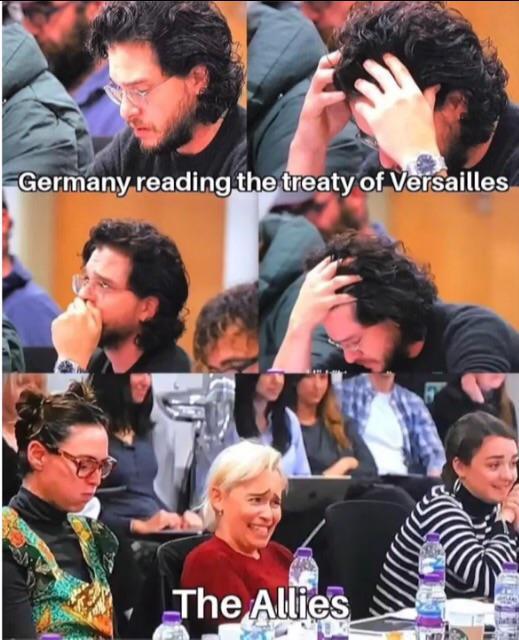#treaty of versailles
Text
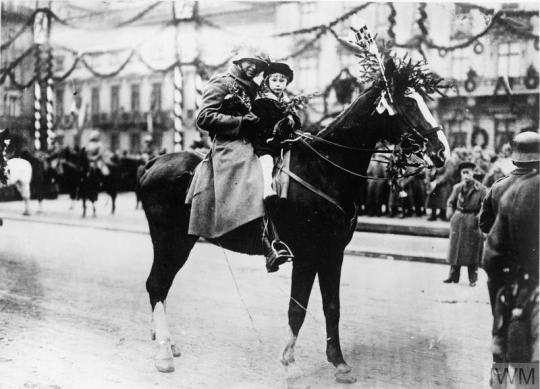
Okay so I left this a bit late but because I'm in NZ i didn't want to be wildly early and then procrastinated a bit, some of you who I know from TTrpg will have seen this image already but it is my favourite homecoming photo from the end of the war, a father and son celebrating as they ride together through their town, decorated for Christmas.
I imagine many other blogs similar to mine will have made posts lamenting the dead today, and while I share their respect for those who passed, I will be doing something slightly different.
I think that it is just as important to remember those that lived, those who returned to shattered countries, to families ruined by famine and disease, those who left a piece of themselves at the front, figuratively and literally.
Heres to honouring those that came home changed forever, those that never had a good night's sleep again, those that buried their friends at Verdun, the Somme, Passchendaele, Gallipoli, Caporetto, Galicia and Tannenburg.
Those who returned to countries that treated them as second class citizens, those who returned home to find the war still going in their little slice of the world, the ones who were lied to, the last ones left and the ones who wished they'd never come home at all.
We need not forget the ones who survived hell and were left to endure its memory to the end of their days.
I love you all, and though we'll never meet, you have my heart forever and always.
#edwardian#ww1#first world war#1910s#remembrance day#armistice day#November 11th#treaty of versailles#the great war
55 notes
·
View notes
Text

Goebbels s'exprime contre le résultat de la conférence de Lausanne sur les réparations de guerre lors d'une réunion de protestation du parti national-socialiste – Lustgarten – Berlin – Juillet 1932
©Bundesarchiv - Bild 119-2406-01
#avant-guerre#pre-war#conférence de Lausanne#Lausanne Conference#traité de Versailles#treaty of Versailles#joseph goebbels#goebbels#lustgarten#berlin#allemagne#germany#07/1932#1932
50 notes
·
View notes
Text
Aus solchem aufgezwungenen Frieden müßte neuer Haß zwischen den Völkern und im Verlauf der Geschichte neues Morden erwachsen.
From such an enforced peace new hatred between the peoples and in the course of history new murders should grow.
Friedrich Ebert (1871 – 1925), German politician and first president of the Weimar Republic commenting on the treaty of Versailles
9 notes
·
View notes
Text
What if World War I had never happened?
If World War I had never happened, the world would have been very different from what we know today. Here are some possible scenarios of what could have happened:
The collapse of empires may have been delayed: World War I was a major factor in the collapse of empires such as the Austro-Hungarian, Ottoman, and Russian empires. Without the war, it's possible that these empires would have survived longer.
The League of Nations may not have been created: The League of Nations was created in the aftermath of World War I as a means of preventing future wars. Without the war, it's possible that the League would never have been established.
The Russian Revolution may not have happened: World War I was a contributing factor to the Russian Revolution, as the war had placed enormous strains on the Russian economy and military. Without the war, it's possible that the Russian Revolution would not have occurred.
The Treaty of Versailles may not have been signed: The Treaty of Versailles, which imposed heavy reparations on Germany and helped lay the groundwork for World War II, was a direct result of World War I. Without the war, it's possible that the treaty would never have been signed.
National borders may have been different: The redrawing of national borders in Europe after World War I had a profound impact on the continent's political and economic development. Without the war, it's possible that national borders would have remained largely unchanged.
Overall, it's impossible to predict exactly what would have happened if World War I had never occurred. However, the war had a profound impact on the world, shaping the geopolitical landscape and altering the course of history.
#Weimar Republic#germany#ww1 history#what if#british history#europe#Treaty of Versailles#Versailles#british empire#Second World War#First World War#questions#today on tumblr#history#british#deep thoughts#freedom
5 notes
·
View notes
Text
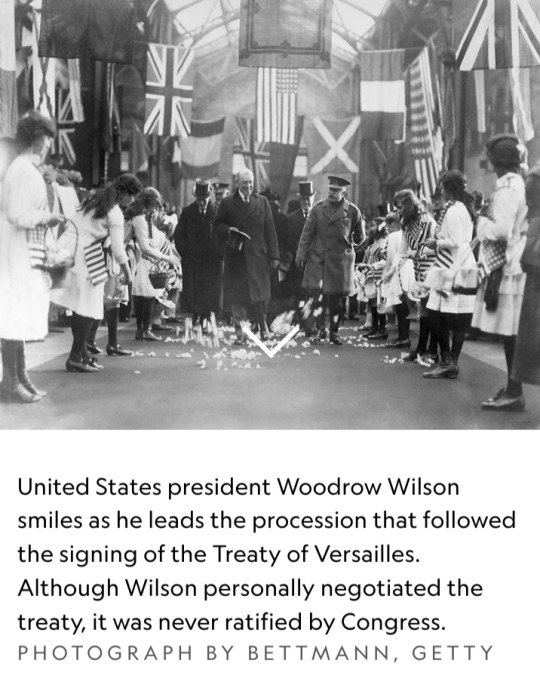
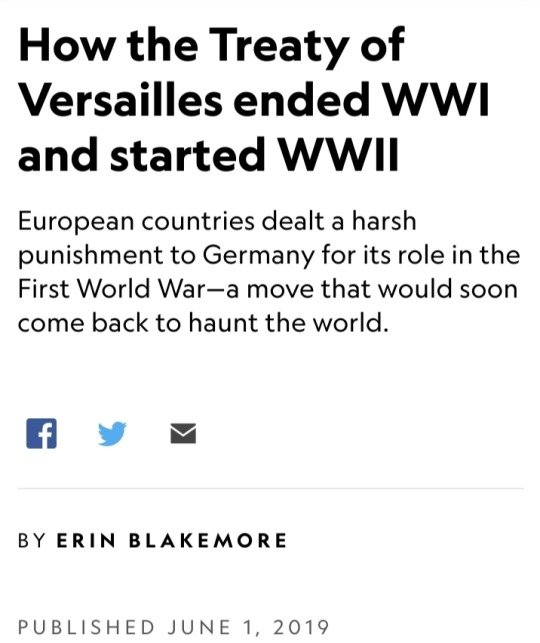
On 28 June 1919, on the outskirts of Paris, European dignitaries crowded into the Palace of Versailles to sign one of history’s most hated treaties.
Known as the Treaty of Versailles, it formally ended World War I—and at the same time laid the foundation for the Second World War.
Though it was preceded by a peace conference that lasted over a year, the treaty was disliked by every nation that signed it.
Over 65 million people had fought in World War I, and more than 8.5 million military members and at least 6.6 million civilians died.
The war decimated farmland, towns, and battlefields around Europe. And according to many, Germany was to blame.
Though contemporary historians are still split on who should be held responsible for World War I, the treaty blamed and punished Germany.
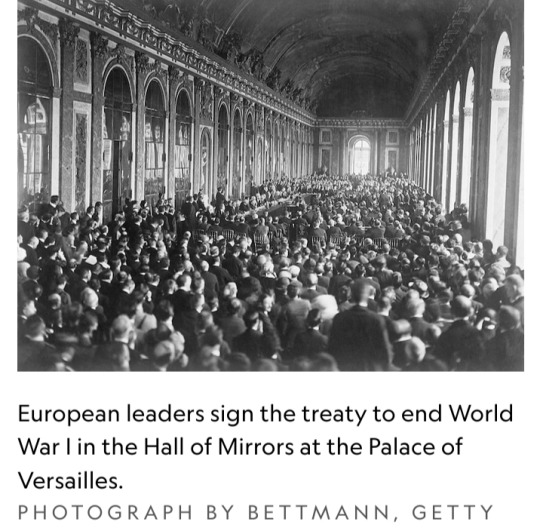
From idealism to punishment
During World War I, President Woodrow Wilson had proposed the Fourteen Points, a blueprint for world peace that included establishing an association of nations to ensure European security and prevent nations’ abilities to enter into secretive mutual protection treaties.
Much of that idealistic plan was scuttled during negotiations when the other Allied nations shifted their priorities toward reparations.
The treaty itself was predicated on Germany’s guilt for the war.
The document stripped Germany of 13 percent of its territory and one tenth of its population.
The Rhineland was occupied and demilitarized, and German colonies were taken over by the new League of Nations.
The German army was diminished to 100,000 men and the country was forbidden to draft soldiers. Its weapons were largely confiscated and its navy stripped of large vessels.
Germany was forced to put Wilhelm II, its emperor, on trial for war crimes.
And the treaty required Germany to pay 269 billion gold marks—the equivalent of $37 billion.
European leaders signed the treaty in the Palace of Versailles’ Hall of Mirrors—the very place where the German Empire had been created, and Wilhelm II’s father made emperor, in 1871.
It was a slap in the face to Germany, whose residents saw the famous “war guilt clause" as a humiliation.
(The United States did not ratify the treaty due to political division between Democrats and Republicans.)
The treaty’s aftermath
Though there was a real desire for peace in the wake of the disastrous war, the treaty did not achieve its intended effects.
Furious at what they saw as a harsh “diktat” (a dictated peace), right-wing German politicians used the treaty as a nationalist rallying point.
The staggering reparations payments reduced the country’s industrial output, and other forces thrust Germany into hyperinflation in the 1920s, which played into the economic instability of the Great Depression.
European leaders were dissatisfied with the redrawn map of Europe and the concessions they each had made in the name of an uneasy peace, with some disappointed that Germany hadn’t been treated even more harshly.
In 2010, ninety years after the Treaty of Versailles went into force, Germany finally paid off the last installment of its war debt.
By then, another world war was behind it.
Today, the Treaty of Versailles lingers as a study in how, when it comes to war, unintended consequences can negate even the best intentions.
#Treaty of Versailles#World War I#Palace of Versailles#Hall of Mirrors#US President Woodrow Wilson#Fourteen Points#League of Nations#Germany#Wilhelm II#Europe
2 notes
·
View notes
Text

6 notes
·
View notes
Text
"In the years after the Directorate of the State Mental Hospitals was set up, interference by the National Board of Health was not the psychiatrists’ biggest concern—in fact, some decades later, the chief physicians had to appeal to the Board of Health to engage more directly with the Directorate’s work. Rather, the main problem was the head of the Directorate himself, Georg Brøchner-Mortensen, a former inspector of the Copenhagen prison, Vestre Fængsel. He ended up at the helm of the organisation for 30 years, during which time—according to many disgruntled psychiatrists—he kept the state hospitals on a very short leash.
At first, however, there were few open expressions of dissatisfaction with Brøchner-Mortensen, largely because both the director and the psychiatrists had so much else to do. The first major task was dealing with the aftermath of the “reunification of Denmark”—or partition of Schleswig—in 1920. As part of the Treaty of Versailles after World War I, the rural areas in Northern Schleswig were returned to Denmark from Germany. On 11 July, hundreds of thousands of Danes thronged the streets, singing patriotic songs, cheering loudly and toasting the expansion of the kingdom.
The mood in the Directorate of the State Mental Hospitals was less euphoric. For the Directorate, Northern Schleswig did not return like “the apple of a mother’s eye, in the dawn of a new era,” as the author Henrik Pontoppidan put it in his poem to mark the occasion. Rather, it was a burden—a problem that required a swift solution. This new part of the country did not have a mental hospital, and new institutions were needed. To compound matters, many young men from the area had fought on the German side in the war and witnessed unimaginable carnage in the muddy trenches. Troops from North Schleswig had been deployed on the Eastern and Western fronts, done some of the worst jobs and fought in the bloodiest battles, at the Somme and Verdun. In total, 30,000 Danish-speaking troops from North Schleswig fought in the war. About 6,000 were left as invalids, and the Danish government assumed responsibility for their care in December 1920.
A large number of veterans were classified as suffering from mental disorders brought on by their experiences during the war. Some were admitted to the hospital in Viborg, along with Middelfart and Aarhus, the closest institutions to South Jutland. However, the distances involved were still considerable—South Jutland was over 100 km from Middelfart and more than 200 km from Viborg and Aarhus. Journeys of that length were often an insurmountable obstacle for families who wanted to visit patients."
- Jesper Vaczy Kragh, Lobotomy Nation: The History of Psychosurgery and Psychiatry in Denmark (Springer: 2021) p. 37-38.
#directorate of the state mental hospitals#mental hospital#aarhus#viborg#psychiatric clinic#psychiatric power#danish history#madness and civilization#lobotomy nation#academic quote#reading 2023#history of mental illness#schleswig holstein#treaty of versailles#war wounded#shell shocked
0 notes
Text
Ww1 and ww2 are *technically* the same war
Now hear me out. If you have ever read the treaty that ended ww1, it isn't really much of a treaty. it's more of a 20-year cease fire. Even general Ferdinand Folk agrees that it isn't much of an armistice it is just calling for a 20-year cease fire in hopes that that will stop that war
Now, did that work? No.
Guess what happens 20 years later... World War 2
They are technically the same war, just the conflict picked up again for a different reason.
0 notes
Text

One man ALMOST killed all humanity.
#archduke franz ferdinand#Of Austria#ww1#ww2#austrian painter#mussolini#treaty of versailles#cold war#space race#soviet union#USA#america#Global destruction#im an idiot#Humans kill eachother every single moment#world history#One man almost killed every single one if us#You are so insignificant#WORLD WARS
1 note
·
View note
Text
Treaty of Versailles
#WWI, #TreatyofVersailles, #worldWar1
The Treaty of Versailles – Warpedia
The Treaty of Versailles, signed on June 28, 1919, marked the official end of World War I and aimed to establish a lasting peace. However, its terms and consequences would shape the course of history, setting the stage for future conflicts. This blog post delves into the events leading up to the treaty, for example its key provisions, and the impact it had on…
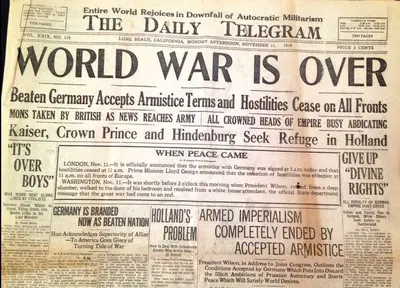
View On WordPress
#Treaty of Versailles#treaty of versailles terms#treaty of versailles ww1#treaty of versailles ww2#treaty of versailles WWI#warpedia#warpedia.net#world war 1#ww2
0 notes
Photo
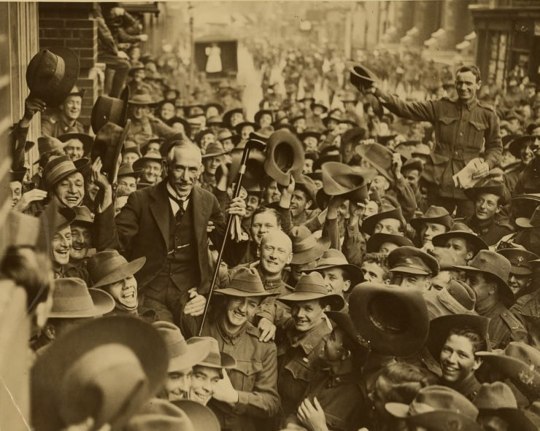
Des soldats australiens portent en triomphe le Premier Ministre australien William Morris 'Billy' Hughes le long de George Street après son retour de la Conférence de la Paix de Paris (Traité de Versailles) – Sydney – Australie – 1919
©National Library of Australia - NLA an23150756
#WWI#Avant-guerre#Pre-war#Conférence de la paix de Paris#Paris Peace Conference#Traité de Versailles#Treaty of Versailles#Premier Ministre Australien#Prime Minister of Australia#William Morris 'Billy' Hughes#Billy Hughes#Sydney#Australie#Australia#1919
3 notes
·
View notes
Text
1919-Versailles
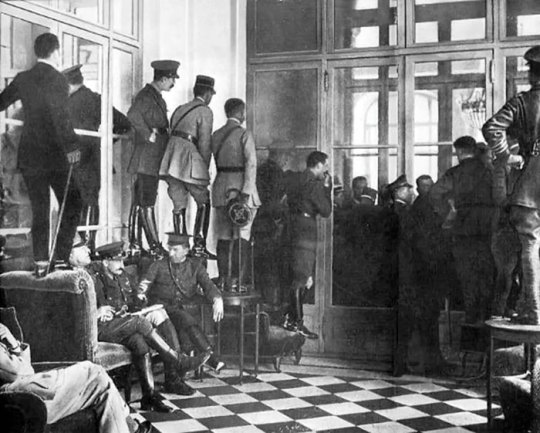
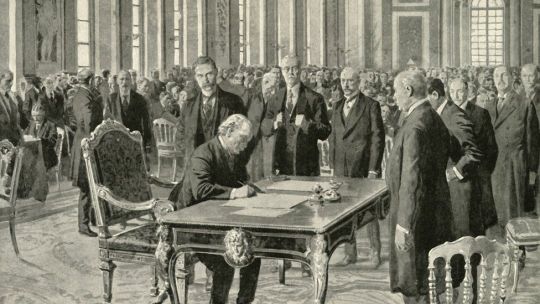
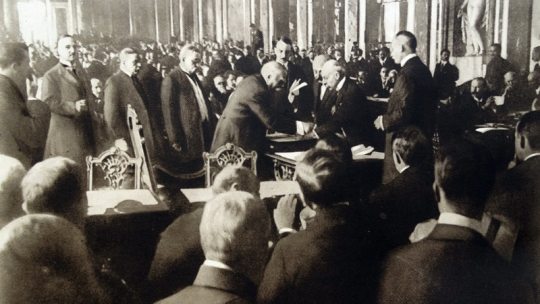
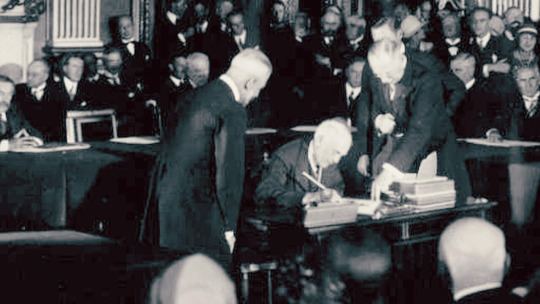
The Treaty of Versailles[i] was a peace treaty signed on 28 June 1919. As the most important treaty of World War I, it ended the state of war between Germany and most of the Allied Powers. It was signed in the Palace of Versailles, exactly five years after the assassination of Archduke Franz Ferdinand, which led to the war. The other Central Powers on the German side signed separate treaties.[ii] The United States never ratified the Versailles treaty and made a separate peace treaty with Germany. Although the armistice of 11 November 1918 ended the actual fighting, it took six months of Allied negotiations at the Paris Peace Conference to conclude the peace treaty. Germany was not allowed to participate in the negotiations—it was forced to sign the final result.
0 notes
Text
little reminder that the Treaty of Versailles is "You can't sit with us." And The Warsaw Pact is "Get in loser, we're going shopping!" hope this helps x
1 note
·
View note
Text
What if Germany won World War One?
If Germany had won World War One, the world would be vastly different than it is today. Here are some possible outcomes:
The Treaty of Versailles would not have been signed: If Germany had won the war, they would not have been forced to sign the Treaty of Versailles, which imposed harsh penalties on Germany and contributed to the rise of Hitler and the Nazi party. Without the treaty, the Weimar Republic may have been able to establish itself more firmly and Germany may not have experienced the economic turmoil that led to the rise of the Nazis.
Changes to Europe's political landscape: A German victory would have meant the defeat of the Entente powers, including France and Britain. This would have likely led to the collapse of their empires, including the British Empire, and the redrawing of borders in Europe. Germany would have likely become the dominant power in Europe, with a new political and economic order.
Different outcomes in World War Two: Without the Treaty of Versailles, it's possible that World War Two may never have occurred or would have been vastly different in terms of the alliances and strategies involved. It's also possible that a victorious Germany may not have pursued the same aggressive territorial expansion that led to the Second World War.
Changes in technology and society: Winning the war would have given Germany access to the resources and technology of the defeated powers. This could have accelerated technological advancements in Germany and led to changes in society and culture.
Overall, it's difficult to predict exactly how the world would have been different if Germany had won World War One, but the outcome would have been far-reaching and significant.
#Weimar Republic#germany#ww1 history#what if#british history#europe#Treaty of Versailles#Versailles#british empire#Second World War#First World War#questions
1 note
·
View note
Text
The way English speakers pronounce "Versailles" personally offends me
0 notes
